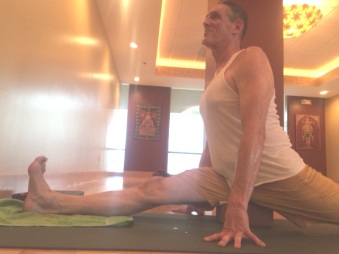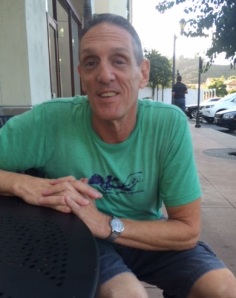What’s a typical day for you?
I’m a health care professional. I’ve been working nights for 6 ½ years in the overnight psych department. So do I get bored? No. Is there a dull moment? No, not really. I’m basically a mental health paramedic. I’m a psychologist. I do crisis intervention. I see people when they’re at their worst or in crisis.
I usually get up between 1:30 and 2pm. This is my morning and I’m just kind of on my own time. I go to yoga around 5:30pm and that’s usually done by 7:30. Then I’ll go home to shower and get a bite to eat, take a power nap, then go to work. I have to be there by 11pm. I’m done at 7:30am. Then I drive 40 minutes from Kearny Mesa to get home.
You know you’re a mental health professional when __you get mental__.
A good portion of mental health professionals also have mental health issues. They just have a better way of managing them than the patients do. The professionals can make it so their issues don’t interfere with all areas life. Most mental health professionals won’t openly admit their issues. But I’ll be the first to admit mine. My job gives me the perfect opportunity to walk my talk.
Why do you choose to work nights?
Initially I chose nights because it was a way to get my foot in the door. I was working up in West LA, in the Santa Monica area, in a private professional practice. I got burned out working with the entertainment industry so I interviewed down here. I was hired, but it was for nights. I had already worked nights for a lot of years. The pay is very good. I get a really nice overnight stipend. I don’t even know that I would want to work days anymore, to be honest with you. With nights, I don’t have to deal with any administrative politics or disruptions. There’s a lot less staffing at nighttime so we’re usually more cohesive and team-oriented. I get to make more independent decisions, which works well for me.
With this crazy schedule, it seems difficult to sustain a love life.
It doesn’t mean I haven’t tried. I’ve had a couple of quasi or semi-successful relationships. But it just hasn’t worked for me. I can use my schedule as part of the reasoning, but I’m probably a bit of a lunatic. A healthy lunatic. I have a good balance between optimism and skepticism.
What makes you angry?
Inconsiderate and disrespectful people. Some people don’t have any regard for others. Like they have a sociopathology. Like their life is more important or inflated than anyone else’s. There’s a healthy degree of Sense of Self but there’s also an environment outside of Self. So we shouldn’t violate the boundaries of others. I see this a lot at work. I see the negative results of such behavior. It can be very traumatizing for people.
What charities do you support?
Rady’s Children’s Hospital and other children-related charities. I work a lot with kids because that really hits home for me. On a regular basis I see a lot of kids very traumatized. And it really covers the gamut of trauma.
You are a Vietnam Veteran. What was war and wartime like for you?
In my 20s I was very reckless and I had enough intelligence to be dangerous. One of my reasons for going into the military in the first place (other than that I was under #10 in the draft lottery for 3 consecutive years) is that I was involved in some drug-related minor offenses. It was getting progressively worse so I figured I should enlist in the army to at least have some more options and benefits. I needed structure.
I was there at the end of th e conflict. I spent only 6 months in Vietnam and the rest of my 2 years in Germany, which I loved. I wasn’t on the front lines. I worked in food so, for me, war wasn’t that bad. Plus there were a lot of ways to alter that reality. Drugs. And alcohol. And drugs. And alcohol. I’d say 80-85% of the guys over there were on something. Most of them didn’t acknowledge it. And, well, they were in war so… (shrugs) It was kind of like the Wild, Wild West in a lot of ways.
e conflict. I spent only 6 months in Vietnam and the rest of my 2 years in Germany, which I loved. I wasn’t on the front lines. I worked in food so, for me, war wasn’t that bad. Plus there were a lot of ways to alter that reality. Drugs. And alcohol. And drugs. And alcohol. I’d say 80-85% of the guys over there were on something. Most of them didn’t acknowledge it. And, well, they were in war so… (shrugs) It was kind of like the Wild, Wild West in a lot of ways.
So you enlisted to get away from drugs, but drugs were everywhere. How did you handle that?
Long story short, 2 years into it in Germany, I got busted for drug possession (narcotics and paraphernalia.) It was a sting operation. Another armed service member, to save himself, informed on me. I spent about 2 months in a German jail which I have to admit was one of the most accommodating I’ve ever experienced. Very good food, wine, and once or twice a month, if the male inmates wanted, they would have Ladies of the Night come in.
I beat the case in military tribunal court but the commanding general overturned the ruling. So I was sent from a German jail to a military jail. I had the option of taking an undesirable discharge or going back to a retraining brigade in the United States. That included a reduction in rank and I would have to work my way back up. So that’s what I did.
Describe your road to sobriety.
I remained clean for nearly 1 year, then resumed drug use when opportunity presented itself. I didn’t relapse because I wasn’t participating in a recovery program for myself. At the time, I hadn’t bottomed out, so I wasn’t motivated for change. I extended my relationship with my drug of choice for another 17 years.
During those 17 years, I graduated from college, maintained steady employment and was involved in 3 long term relationships. I was a functional addict with a “Dr Jekyll, Mr Hyde” persona. I’m not glamorizing the lifestyle, rather, I’m describing my personal experience thru the progression of addiction.
Eventually, I was unable to maintain the facade of functionality, yet I continued to use narcotics. Insanely crazy, I know, but that’s the inherent nature of the beast. My epiphany came when I realized that the narcotics no longer worked for me. I couldn’t achieve a high or even a semblance of normalcy. I had finally reached my “bottom,” which was a hollowed depression.
With the last ditch assistance from my aunt, I voluntarily entered a long-term rehab in West Los Angeles. I used dogged determination to change direction and reinvent myself. Honestly, that was the most challenging and difficult endeavor I’d attempted. That was 24 years ago.

That’s an excellent interview Rachel, and kudos to Randy for his honestly, ability to change and continue to make a positive effect on others.
Sent from my iPad
>
LikeLike
I love Randy more after reading this interview. I agree with Alison, great interview Rachel – and Randy, thank you for being so open and sharing your life with us.
LikeLike